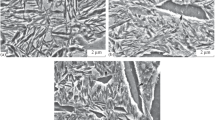Conclusions
-
1.
The influence of abrasive particles under high pressures causes phase transformations (martensitic) in the working surface of unstable austenitic steels.
-
2.
The intensity of the martensitic transformation depends on the nature of the solid solution.
-
3.
Unstable austenitic chromium steels tend to greater hardening of the surface layer and are more resistant to abrasive wear than stable chromium-nickel and chromium-manganese steels, which are hardened only by plastic deformation.
-
4.
The wear resistance and hardening of unstable austenitic steels depend on the completeness of the martensitic transformation and on the properties of thea phase formed during wear.
Similar content being viewed by others
Literature cited
S. M. Popov and V. S. Popov, Metal. i Term. Obrabotka Metal., No. 11 (1970).
O. I. Kovalenko et al., Izv. Akad. Nauk SSSR, Metally, No. 2 (1965).
G. V. Kurdyumov et al., in: Problems of Metal Science and Physics of Metals [in Russian], Metallurgizdat, Moscow (1955).
Additional information
V. Ya. Chubar' Zaporozh'e Machine Construction Institute. Translated from Metallovedenie i Termicheskaya Obrabotka Metallov, No. 3, pp. 60–62, March, 1973.
Rights and permissions
About this article
Cite this article
Popov, S.M., Popov, V.S. Transformation in the surface layer of steels during abrasive wear. Met Sci Heat Treat 15, 241–243 (1973). https://doi.org/10.1007/BF00648164
Issue Date:
DOI: https://doi.org/10.1007/BF00648164



